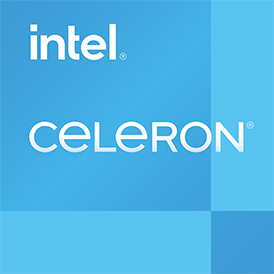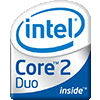
Intel Celeron 3765U Benchmark, test e specifiche
Ultimo aggiornamento:
Intel Celeron 3765U è stato rilasciato in Q2/2015 e ha 2 core. Il processore può elaborare 2 thread contemporaneamente e utilizza una scheda madre con il socket BGA 1168. Nel benchmark Geekbench 5, Intel Celeron 3765U ha ottenuto un risultato di 443 punti (single-core) o 868 punti (multi -nucleo).

| Cognome: | Intel Celeron 3765U |
|---|---|
| Famiglia: | Intel Celeron (165) |
| Gruppo CPU: | Intel Celeron 3000 (10) |
| Architettura : | Kaby Lake U |
| Segmento: | Mobile |
| Generazione: | 7 |
| Predecessore: | -- |
| Successore: | -- |
CPU Cores e frequenza di base
Il Intel Celeron 3765U ha 2 core. La frequenza di clock di Intel Celeron 3765U è 1,90 GHz. È possibile effettuare una valutazione iniziale delle prestazioni utilizzando il numero di core della CPU.
| CPU Cores / Threads: | 2 / 2 |
|---|---|
| Architettura principale: | normal |
| Cores: | 2x |
| Hyperthreading / SMT: | No |
|---|---|
| Overclocking: | No |
| Frequenza: | 1,90 GHz |
| Turbo Frequenza (1 Core ): | -- |
| Turbo Frequenza (2 Cores): | -- |
Grafica interna
Intel Celeron 3765U ha una grafica integrata che il sistema può utilizzare per riprodurre in modo efficiente i video, ad esempio. Intel Celeron 3765U ha Intel HD Graphics (Broadwell GT1) installato, che ha 12 multiprocessori di streaming (96 shader).
| nome GPU: | Intel HD Graphics (Broadwell GT1) |
|---|---|
| Frequenza GPU : | 0,10 GHz |
| GPU (Turbo ): | 0,80 GHz |
| Unità di esecuzione: | 12 |
| Shader: | 96 |
| Hardware Raytracing: | No |
| Data di lancio : | Q1/2015 |
| Max. visualizzazioni: | 3 |
|---|---|
| Generation: | 8 |
| Direct X: | 11.2 |
| Tecnologia : | 14 nm |
| Max. GPU Memoria: | 2 GB |
| Frame Generation: | No |
Hardware codec support
I processori con grafica integrata possono elaborare più velocemente utilizzando questi codec video. Il supporto per i codec moderni può aumentare significativamente l'efficienza del sistema durante la riproduzione video.
| h265 / HEVC (8 bit): | No |
|---|---|
| h265 / HEVC (10 bit): | No |
| h264: | Decodificare / Codificare |
| VP8: | Decodificare |
| VP9: | No |
| AV1: | No |
|---|---|
| AVC: | Decodificare / Codificare |
| VC-1: | Decodificare |
| JPEG: | Decodificare |
Memoria & PCIeIntel Celeron 3765U supporta un massimo di 16 GB memoria. A seconda della scheda madre, il processore può utilizzare un massimo di 2 (Dual Channel) canali di memoria. Ciò si traduce in una larghezza di banda massima della memoria principale di 25,6 GB/s. |
|
| Tipo di memoria : | Banda di memoria: |
|---|---|
| LPDDR3-1600 DDR3L-1600 | 12,8 GB/s 25,6 GB/s |
| Max. Memoria: | 16 GB |
| Canali di memoria : | 2 (Dual Channel) |
| ECC: | No |
| PCIe: | 2.0 x 12 |
| PCIe Larghezza di banda: | 6,0 GB/s |
Gestione termicaIntel Celeron 3765U ha un TDP di 15 W. Sulla base del TDP, il produttore del sistema può e deve adattare la soluzione di raffreddamento al processore. |
|
|---|---|
| TDP (PL1 / PBP): | 15 W |
| TDP (PL2): | -- |
| TDP up: | -- |
| TDP down: | 10 W |
| Tjunction max.: | 105 °C |
Dettagli tecnici
La produzione moderna riduce il calore disperso di un processore e ne aumenta l'efficienza. Intel Celeron 3765U è realizzato in 14 nm e ha 2,00 MB cache.
| Tecnologia : | 14 nm |
|---|---|
| Design a chip: | Monolitico |
| Presa: | BGA 1168 |
| L2-Cache: | -- |
| L3-Cache: | 2,00 MB |
| AES-NI: | Si |
| Sistemi operativi: | Windows 10, Linux |
| Virtualizzazione: | VT-x, VT-x EPT, VT-d |
|---|---|
| Set di istruzioni (ISA): | x86-64 (64 bit) |
| Estensioni ISA: | SSE4.1, SSE4.2 |
| Data di lancio : | Q2/2015 |
| Prezzo di rilascio: | -- |
| Numero di parte: | -- |
| Documenti: | Scheda tecnica |
Valuta questo processore
Risultati di benchmark

I risultati del benchmark per Intel Celeron 3765U sono stati attentamente controllati da noi. Pubblichiamo solo risultati di benchmark che sono stati creati da noi o che sono stati inviati da un visitatore e poi controllati da un membro del team. Tutti i risultati sono basati e rispettano le nostre linee guida di benchmark.
Geekbench 5, 64bit (Single-Core)
Geekbench 5 è un benchmark multi-piattaforma che usa in modo intensivo la memoria del sistema.Il test single-core utilizza solo un nucleo elaborativo della CPU. A tal fine, il numero di nuclei elaborativi o la capacità di hyperthreading non sono rilevanti.

|
Intel Celeron 2950M
2C 2T @ 2,00 GHz |
||

|
Qualcomm Snapdragon 685 4G
8C 8T @ 2,80 GHz |
||

|
Intel Pentium D1517
4C 8T @ 2,20 GHz |
||
|
|
Intel Celeron 3765U
2C 2T @ 1,90 GHz |
||

|
Intel Pentium 3825U
2C 4T @ 1,90 GHz |
||

|
Intel Celeron G530
2C 2T @ 2,40 GHz |
||

|
AMD A8-5557M
4C 4T @ 3,10 GHz |
||
Geekbench 5, 64bit (Multi-Core)
Geekbench 5 è un benchmark multi-piattaforma che usa in modo intensivo la memoria del sistema.Il test multi-core coinvolge tutti i nuclei elaborativi della CPU e si avvale del hyperthreading.

|
AMD GX-420CA
4C 4T @ 2,00 GHz |
||

|
Intel Core i5-3339Y
2C 4T @ 1,50 GHz |
||

|
Intel Core2 Duo E8500
2C 2T @ 3,16 GHz |
||
|
|
Intel Celeron 3765U
2C 2T @ 1,90 GHz |
||

|
AMD Athlon II X2 265
2C 2T @ 3,30 GHz |
||

|
MediaTek Helio P25
8C 8T @ 2,60 GHz |
||

|
MediaTek MT8169A
6C 6T @ 2,00 GHz |
||
Geekbench 6 (Single-Core)
Geekbench 6 è un punto di riferimento per computer, notebook e smartphone moderni. Ciò che è nuovo è un utilizzo ottimizzato delle architetture CPU più recenti, ad esempio basate sul concetto big.LITTLE e combinando core CPU di diverse dimensioni. Il benchmark single-core valuta solo le prestazioni del core della CPU più veloce, il numero di core della CPU in un processore è irrilevante qui.

|
Intel Pentium 3805U
2C 2T @ 1,90 GHz |
||

|
Intel Pentium B950
2C 2T @ 2,10 GHz |
||

|
Qualcomm Snapdragon 670
8C 8T @ 2,00 GHz |
||
|
|
Intel Celeron 3765U
2C 2T @ 1,90 GHz |
||

|
Qualcomm Snapdragon 821
4C 4T @ 2,40 GHz |
||

|
Samsung Exynos 9610
8C 8T @ 2,30 GHz |
||

|
Intel Core i3-2328M
2C 4T @ 2,20 GHz |
||
Geekbench 6 (Multi-Core)
Geekbench 6 è un punto di riferimento per computer, notebook e smartphone moderni. Ciò che è nuovo è un utilizzo ottimizzato delle architetture CPU più recenti, ad esempio basate sul concetto big.LITTLE e combinando core CPU di diverse dimensioni. Il benchmark multi-core valuta le prestazioni di tutti i core della CPU del processore. I miglioramenti del thread virtuale come AMD SMT o l'Hyper-Threading di Intel hanno un impatto positivo sul risultato del benchmark.

|
Intel Core i3-3217U
2C 4T @ 1,80 GHz |
||

|
Intel Pentium 3805U
2C 2T @ 1,90 GHz |
||

|
Intel Pentium N3540
4C 4T @ 2,66 GHz |
||
|
|
Intel Celeron 3765U
2C 2T @ 1,90 GHz |
||

|
Intel Celeron 5205U
2C 2T @ 1,90 GHz |
||

|
Intel Celeron 2950M
2C 2T @ 2,00 GHz |
||

|
Intel Celeron 3855U
2C 2T @ 1,60 GHz |
||
iGPU - Prestazioni FP32 (GFLOPS a precisione singola)
Le prestazioni di calcolo teoriche dell'unità grafica interna del processore con precisione semplice (32 bit) in GFLOPS. GFLOPS indica quanti miliardi di operazioni in virgola mobile che l'iPPU può eseguire al secondo.

|
Intel Celeron 3205U
Intel HD Graphics (Broadwell GT1) @ 0,80 GHz |
||

|
Intel Celeron 3755U
Intel HD Graphics (Broadwell GT1) @ 0,80 GHz |
||

|
Intel Pentium 3805U
Intel HD Graphics (Broadwell GT1) @ 0,80 GHz |
||
|
|
Intel Celeron 3765U
Intel HD Graphics (Broadwell GT1) @ 0,80 GHz |
||

|
Intel Celeron J3060
Intel HD Graphics 400 @ 0,70 GHz |
||

|
Intel Celeron J3160
Intel HD Graphics 400 @ 0,70 GHz |
||

|
Intel Celeron J4125
Intel UHD Graphics 600 @ 0,75 GHz |
||
Risultati stimati da PassMark CPU Mark
Alcune delle CPU elencate di seguito sono stati sottoposti a benchmarking da CPU-monkey. Tuttavia, la maggior parte delle CPU non sono state testate e i risultati sono stati stimati utilizzando una formula segreta di proprietà di CPU-monkey. Come tali, essi non riflettono con precisione i valori attuali di Passmark CPU Mark e non sono stati approvati da PAssMark Software Pty Ltd.

|
Intel Core i3-2350M
2C 4T @ 2,30 GHz |
||

|
AMD Athlon II X2 270
2C 2T @ 3,40 GHz |
||

|
Intel Celeron 2950M
2C 2T @ 2,00 GHz |
||
|
|
Intel Celeron 3765U
2C 2T @ 1,90 GHz |
||

|
Intel Celeron 1020M
2C 2T @ 2,10 GHz |
||

|
Intel Celeron J3160
4C 4T @ 2,24 GHz |
||

|
Intel Celeron 3855U
2C 2T @ 1,60 GHz |
||
Cinebench R15 (Single-Core)
Cinebench R15 è il successore di Cinebench 11.5 ed è anch'esso basato su Cinema 4D. Cinema 4D è un software usato a livello mondiale per creare forme in 3D. Il test single-core utilizza solo un nucleo elaborativo della CPU. A tal fine, il numero di nuclei elaborativi o la capacità di hyperthreading non sono rilevanti.

|
AMD Phenom II X4 940
4C 4T @ 3,00 GHz |
||

|
AMD Phenom II X6 1035T
6C 6T @ 3,10 GHz |
||

|
Intel Pentium Silver N5000
4C 4T @ 2,70 GHz |
||
|
|
Intel Celeron 3765U
2C 2T @ 1,90 GHz |
||

|
AMD FX-9800P
4C 4T @ 3,60 GHz |
||

|
Intel Celeron N4120
4C 4T @ 2,60 GHz |
||

|
Intel Pentium 3825U
2C 4T @ 1,90 GHz |
||
Cinebench R15 (Multi-Core)
Cinebench R15 è il successore di Cinebench 11.5 ed è anch'esso basato su Cinema 4D. Cinema 4D è un software usato a livello mondiale per creare forme in 3D. Il test multi-core coinvolge tutti i nuclei elaborativi della CPU e si avvale del hyperthreading.

|
AMD Phenom II X2 545
2C 2T @ 3,00 GHz |
||

|
Intel Celeron J4005
2C 2T @ 2,70 GHz |
||

|
Intel Pentium J3710
4C 4T @ 2,64 GHz |
||
|
|
Intel Celeron 3765U
2C 2T @ 1,90 GHz |
||

|
Intel Pentium 3825U
2C 4T @ 1,90 GHz |
||

|
Intel Pentium N3530
4C 4T @ 2,58 GHz |
||

|
Intel Pentium 3805U
2C 2T @ 1,90 GHz |
||
Benchmarks

Geekbench 5 (SC)
2.488 inserimenti
2.488 inserimenti

Geekbench 5 (MC)
2.461 inserimenti
2.461 inserimenti

Geekbench 6 (SC)
1.755 inserimenti
1.755 inserimenti

Geekbench 6 (MC)
1.703 inserimenti
1.703 inserimenti

FP32 SP (iGPU)
2.042 inserimenti
2.042 inserimenti

PassMark CPU-Mark
2.392 inserimenti
2.392 inserimenti

Cinebench R15 (SC)
1.106 inserimenti
1.106 inserimenti

Cinebench R15 (MC)
1.101 inserimenti
1.101 inserimenti

Geekbench 3 (SC)
942 inserimenti
942 inserimenti

Geekbench 3 (MC)
938 inserimenti
938 inserimenti

Cinebench R11.5 (SC)
825 inserimenti
825 inserimenti

Cinebench R11.5 (MC)
836 inserimenti
836 inserimenti

Cinebench R11.5 iGPU
383 inserimenti
383 inserimenti
Confronti più popolari
Torna all'indice








